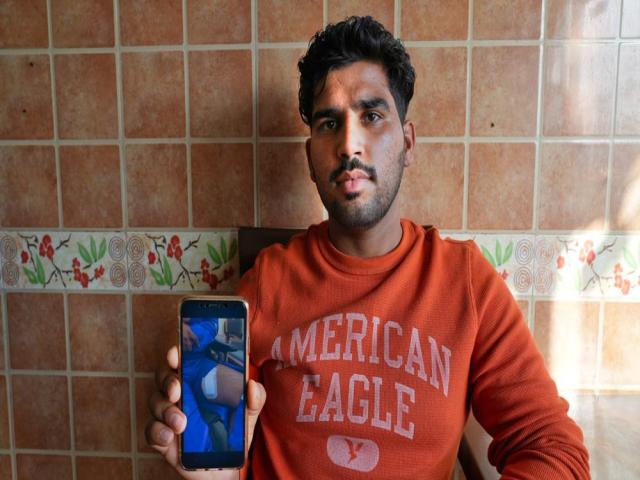Yemen rebel attack on UAE brings tragedy to Indian families

ABU DHABI, United Arab Emirates (AP) — First, there was a pop, like firecrackers, then the world itself seemed to splinter.
Ramjan Rath felt a sharp pain. He looked down, and realized he was on fire.
Rath, whose fuel tanker blew up in a fatal attack on Abu Dhabi last month claimed by Yemen’s Houthi rebels last month, was standing by his truck filling out forms when the drones hit.
“I saw my vehicle burning right in front of my eyes. … There was fire on my feet,” he told The Associated Press on Wednesday from an Indian canteen in Mussafah, the industrial district of Abu Dhabi where the explosion occurred at a nearby state-owned oil facility. “I shook with terror. ... It wasn’t clear what had happened, it all happened so fast.”
He remembers blood gushing from his leg as he ran for his life. Sirens howled. Hours later, he was in a hospital room.
The 24-year-old had come a long way to the industrial side of the Emirati capital, where Yemen’s brutal war reached for the first-known time on Jan. 17. He grew up in a tiny village in the northwestern Indian state of Rajasthan, the youngest son of a farmer.
Rath knew nothing of the yearslong civil war that has riven Yemen, killed thousands of civilians and spawned the world’s worst humanitarian disaster. He’d never heard of the Iran-backed Houthis who seized Yemen’s capital, Sanaa, in 2014, and have been battling a Saudi-led coalition that includes the UAE since 2015.
Like the millions of other low-paid expats who make up the vast foreign labor force powering the UAE’s economy, he had come to the country four years ago for work — the chance to carve out a bit of security for his parents and four older sisters in rural India.
It was a relentless life as a truck driver, working up to 12 hours a day to send money home. But it was a safe one.
Unlike in India, he said, the police were honest, the roads well-paved. He never feared for his life in the federation that is home to oil-rich Abu Dhabi and glitzy Dubai — a refuge in a Middle East mired in conflict and economic collapse.
Yet that changed in a single, violent instant.
“There’s pain, physical and mental. When I sleep at night, or whenever I’m alone, I remember the blast,” Rath said.
He recalls being consumed by guilt in the hospital bed, thinking the inferno must have been his fault, the result of some safety mishap he’d overlooked.
His leg wound required 10 stitches. The ache lingers, causing him to limp. His truck is gone. He can’t work until he heals. He will never tell his family what happened to him, he said. It’s a burden they cannot bear.
But he is alive, and for that he said, he is grateful. Three of his colleagues from India and Pakistan were killed — years of work and accumulated opportunities put to an abrupt end.
One of them was Hardeep Singh. Newly married at 29, he had a bachelor’s degree in computing, enviable skills in the ancient Indian sport of Kabbaddi and dreams of joining his young wife in Canada.
“The house is empty,” Hardeep’s cousin Gagandeep Singh, who called him a brother, said from their village in the northern Indian state of Punjab. “He was our light, our loveable one.”
Hardeep, known to his family as Appu, was the only child of a widow, saddled with the unyielding obligations of a breadwinner. After his wedding last spring, he returned to work in the UAE as a tanker driver for the Abu Dhabi National Oil Co.
He drove night shifts in the emirate of Sharjah. But that bright Monday morning, a fellow driver in the Mussafah district went on leave. Hardeep was sent to replace him. His family never spoke to him again.
His wife, 21-year-old Kanupriya Kaur, has come undone.
“I have no words,” she said by phone, her voice ragged. “There is no future and my memories are full of pain.”
Darkness has settled over the village of Mehsampur Khurd, where Hardeep’s remains returned last month for a massive memorial. Children who knew him as the “fun one” in the village wept, attendees said.
It has been a shock, that the trail of Yemen’s devastating war has been profoundly felt not only at an Abu Dhabi fuel depot but also an ocean away, in an Indian town home to golden temples.
The Saudi-led coalition has bombarded Yemen for years, drawing international criticism for hitting non-military targets like markets, schools, hospitals and wedding parties. The attack on Abu Dhabi that wounded Rath and killed Hardeep triggered a fierce wave of Saudi and Emirati airstrikes on Yemen.
The deadliest one struck a Houthi-run prison in the northern city of Saada, killing some 90 people. Another strike took the entire country off the internet for days.
Meanwhile, residents of the UAE have witnessed a steady drumbeat of missile and drone interceptions over the past weeks, mostly claimed by the Houthis.
The relentless rhythm of interceptors had been far more familiar to residents of Saudi border towns than the gleaming cities of the UAE, where expats outnumber locals nearly nine to one and beaches are bustling this time of year with tourists soaking up the winter sun.
The puncturing of the illusion of safety, Gagandeep said, is another reason for mourning.
“I can’t accept this. ... In this war between two countries, our son is lost. Our family is damaged,” he said. “Never have such things happened in the past.”
A planned $3.4 billion coal-fired power plant in Dubai instead will be converted to use natural gas, the sheikhdom announced, amid the United Arab Emirates’ wider pledge to have net-zero carbon emissions by 2050.
The announcement Thursday came in a statement quoting Sheikh Ahmed bin Saeed Al Maktoum, the chairman of the Dubai Supreme Council of Energy and CEO of the group owning the long-haul carrier Emirates.
The statement offered no details on how much the conversion would cost, nor how that would affect the plant’s planned time to come online in the energy-hungry sheikhdom. The plant also will include a desalination plant to provide the water needed to green its desert dunes.
The Hassyan power plant near Dubai’s border with Abu Dhabi is being built in part by China, which describes the plant as a “major engineering project of the Belt and Road Initiative,” a project which seeks to expand its influence in Africa and Asia. China had anticipated that the plant, which has General Electric Co. involved in its construction, will meet 20% of Dubai’s electrical demand.
Its construction comes as the world is warming, mainly due to rising levels of carbon dioxide and other greenhouse gases in the atmosphere, according to the vast majority of peer-reviewed studies, science organizations and climate scientists. By far, most of the increase in temperature is the result of human activity, which includes burning coal, oil and natural gas. Those warming temperatures fuel extreme weather, such as powerful storms.

5 Reasons Why You Should Use Dubais Safe Driver Service
- A safe driver Dubai service is essentially a driver that you hire for a day or a week. The service will come to your

Online Education Can Save Your Money And Stress
- mastery and powerful Management. These methodologies end up being dissected and laid out compelling. I desire

Choosing A Trustworthy Online Electric Bicycle Seller
- These are the benefits of electric bicycles: they are quick, affordable, quiet, and simple to operate. An electric bike can

Yemen rebel attack on UAE brings tragedy to Indian families
- ABU DHABI, United Arab Emirates (AP) — First, there was a pop, like firecrackers, then the world itself seemed to splinter.